Related Research Articles

Creedence Clearwater Revival, also abbreviated as CCR, was an American rock band formed in El Cerrito, California. The band initially consisted of lead vocalist, lead guitarist, and primary songwriter John Fogerty; his brother, rhythm guitarist Tom Fogerty; bassist Stu Cook; and drummer Doug Clifford. These members had played together since 1959, first as the Blue Velvets and later as the Golliwogs, before settling on Creedence Clearwater Revival in 1967. The band's most prolific and successful period between 1969 and 1971 produced fourteen consecutive top 10 singles and five consecutive top 10 albums in the United States – two of which, Green River (1969) and Cosmo's Factory (1970), reached number one. The band performed at the 1969 Woodstock festival in Upstate New York, and was the first major act signed to appear there.

Cosmo's Factory is the fifth studio album by American rock band Creedence Clearwater Revival, released by Fantasy Records in July 1970. Six of the album's eleven tracks were released as singles in 1970, and all of them charted in the top 5 of the Billboard Hot 100. The album spent nine consecutive weeks in the number one position on the Billboard 200 chart and was certified 4x platinum by the RIAA in 1990.
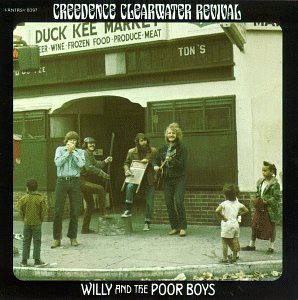
Willy and the Poor Boys is the fourth studio album by American rock band Creedence Clearwater Revival, released by Fantasy Records in November 1969. It was the last of three studio albums the band released that year, arriving just three months after Green River.

Pendulum is the sixth studio album by American rock band Creedence Clearwater Revival, released by Fantasy Records on December 9, 1970. It was the second studio album the band released that year, arriving five months after Cosmo's Factory.

Mardi Gras is the seventh and final studio album by American rock band Creedence Clearwater Revival, released on April 11, 1972. Recorded after the departure of guitarist Tom Fogerty, it was the band's only studio album as a trio, and featured songs written, sung, and produced by each of the remaining members, rather than just John Fogerty. The recording sessions were marred by personal and creative tensions, and the group disbanded after a short U.S. tour to support the album.
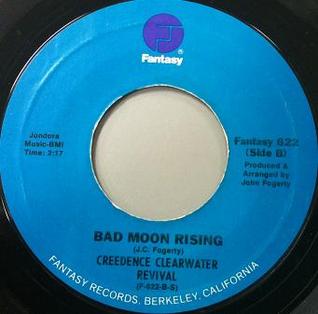
"Bad Moon Rising" is a song written by John Fogerty and performed by Creedence Clearwater Revival. It was the lead single from their album Green River and was released in April 16, 1969 four months before the album. The song peaked at No. 2 on the Billboard Hot 100 chart on 28 June 1969 and reached No. 1 on the UK Singles Chart for three weeks in September of that year. It was CCR's second gold single.

"Proud Mary" is a song by American rock band Creedence Clearwater Revival written by John Fogerty. It was released as a single in January 1969 by Fantasy Records and on the band's second studio album, Bayou Country. The song became a major hit in the United States, peaking at No. 2 on the Billboard Hot 100 in March 1969, the first of five singles to peak at No. 2 for the group.

"Travelin' Band" is a song written by John Fogerty and originally recorded by Creedence Clearwater Revival. It was included on their 1970 album Cosmo's Factory. Backed with "Who'll Stop the Rain", it was one of three double sided singles from that album to reach the top five on the U.S. Pop Singles Chart and the first of two to reach the number 2 spot on the American charts, alongside "Lookin' Out My Back Door", in which they were unable to interrupt the six-week run of the successful number one, "Bridge Over Troubled Water" by Simon and Garfunkel. "Travelin' Band" was also a hit in the UK, reaching number eight on the UK Singles Chart.

"Fortunate Son" is a song by the American rock band Creedence Clearwater Revival released on their fourth studio album, Willy and the Poor Boys in November 1969. It was previously released as a single, together with "Down on the Corner", in September 1969. It soon became an anti-war movement anthem and an expressive symbol of the counterculture's opposition to U.S. military involvement in the Vietnam War and solidarity with the soldiers fighting it. The song has been featured extensively in pop culture depictions of the Vietnam War and the anti-war movement.
The Don Harrison Band were a 1970s American roots rock band that featured Don Harrison on vocals, guitar and keyboards, Stu Cook on bass and piano and Doug Clifford on drums and percussion. Stu Cook and Doug "Cosmo" Clifford were both former members of Creedence Clearwater Revival. The line-up also included Russell DaShiell formerly of Crowfoot on lead and rhythm guitar, piano and vocals. The band merged elements of folk, country, rhythm & blues and rock & roll in a sound reminiscent of CCR.

Chronicle, or fully Chronicle: The 20 Greatest Hits, is a greatest hits album by the American rock band Creedence Clearwater Revival. It was released in January 1976 by Fantasy Records. The edited version of "I Heard It Through the Grapevine" featured on the album was simultaneously released as a single.
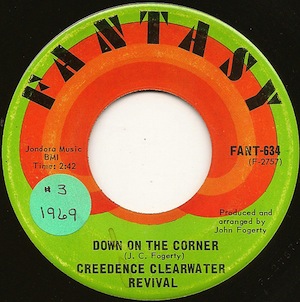
"Down on the Corner" is a song by the American band Creedence Clearwater Revival. It appeared on their fourth studio album, Willy and the Poor Boys (1969). The song peaked at No. 3 on the Billboard Hot 100 on 20 December 1969. The flip side, "Fortunate Son", reached No. 14 on the United States charts on 22 November 1969, the week before Billboard changed its methodology on double-sided hits.
"Susie Q" is a song by musician Dale Hawkins recorded late in the rockabilly era in 1957. He wrote it with bandmate Robert Chaisson, but when released, Stan Lewis, the owner of Jewel/Paula Records and whose daughter Susan was the inspiration for the song, and Eleanor Broadwater, the wife of Nashville DJ Gene Nobles, were credited as co-writers to give them shares of the royalties.

"Up Around the Bend" is a song by American rock band Creedence Clearwater Revival, written by the band's frontman John Fogerty. The song was composed and recorded only a few days prior to the band's April 1970 European tour and was included on the album Cosmo's Factory. Released as a single, with "Run Through the Jungle" on the flipside, the double-sided single climbed to number four on the Billboard Hot 100 chart in the spring of 1970.

"Have You Ever Seen the Rain" is a song written by John Fogerty and released as a single in 1971 from the album Pendulum (1970) by American rock band Creedence Clearwater Revival. The song charted highest in Canada, reaching number 1 on the RPM 100 national singles chart in March 1971. In the U.S., in the same year it peaked at number 8 on the Billboard Hot 100 singles chart. On Cash Box pop chart, it peaked at number 3. In the UK, it reached number 36. It was the group's eighth gold-selling single. In March 2023, the song surpassed one billion streams on Spotify.
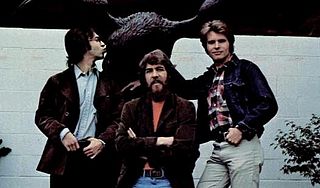
The discography of American rock band Creedence Clearwater Revival, who released their first album and singles in July 1968, includes 7 studio albums, 3 live albums, 41 compilation albums, and 29 singles. The group, although only active for 4 years, has sold more than 30 million albums and singles in the United States alone, and has charted in multiple countries throughout the world.
Creedence Country is a compilation album by American rock band Creedence Clearwater Revival (CCR). It was released by Fantasy Records in October 1981 with the purpose of infiltrating the country market.

"Green River" is a song by American rock band Creedence Clearwater Revival. It was written by John Fogerty and released as a single in July 1969, one month before the album of the same name was released. "Green River" peaked at number two for one week, behind "Sugar, Sugar" by The Archies, and was ranked by Billboard as the No. 31 song of 1969.

"Sweet Hitch-Hiker" is a song by the American roots/swamp rock band Creedence Clearwater Revival from their 1972 album Mardi Gras. It was first released as a single in 1971 and reached #6 on the Billboard Hot 100, becoming their 9th and last top 10 hit. On the Record Retailer UK Singles Chart, it peaked at #36.
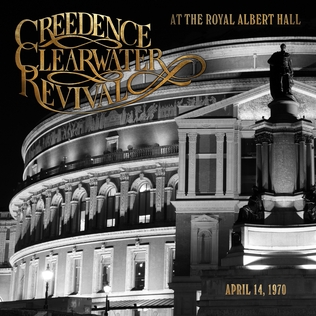
At the Royal Albert Hall is a 2022 live album recorded in 1970 with American swamp rock band Creedence Clearwater Revival. The performance was released as an album to coincide with the documentary film Travelin’ Band: Creedence Clearwater Revival at the Royal Albert Hall, directed by Bob Smeaton. The recordings document the band's first European tour and feature footage that has never been released; the album includes the entire set recorded on April 14, 1970.
References
- ↑ Broadcast Music, Inc (1971). The Many Worlds of Music. Broadcast Music, Incorporated. p. 10.
- ↑ "The History of Rock Music. Creedence Clearwater Revival: Biography, discography, reviews, links".
- ↑ "Creedence Clearwater Revival Album & Song Chart History: Hot 100". Billboard . Retrieved April 10, 2011.
https://www.chartsurfer.de/artist/creedence-clearwater-revival/hey-tonight-song_gcc.html